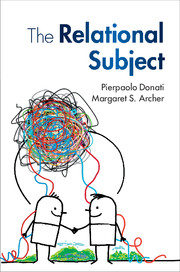
-
Select format
-
- Publisher:
- Cambridge University Press
- Publication date:
- 05 July 2015
- 17 June 2015
- ISBN:
- 9781316226780
- 9781107106116
- 9781107513952
- Dimensions:
- (228 x 152 mm)
- Weight & Pages:
- 0.65kg, 360 Pages
- Dimensions:
- (228 x 152 mm)
- Weight & Pages:
- 0.52kg, 356 Pages
- Subjects:
- Social Theory, Philosophy of Social Science, Philosophy, Sociology
You may already have access via personal or institutional login- Subjects:
- Social Theory, Philosophy of Social Science, Philosophy, Sociology
Book description
Many social theorists now call themselves 'relational sociologists', but mean entirely different things by it. The majority endorse a 'flat ontology', dealing exclusively with dyadic relations. Consequently, they cannot explain the context in which relationships occur or their consequences, except as resultants of endless 'transactions'. This book adopts a different approach which regards 'the relation' itself as an emergent property, with internal causal effects upon its participants and external ones on others. The authors argue that most 'relationists' seem unaware that analytical philosophers, such as Searle, Gilbert and Tuomela, have spent years trying to conceptualize the 'We' as dependent upon shared intentionality. Donati and Archer change the focus away from 'We thinking' and argue that 'We-ness' derives from subjects' reflexive orientations towards the emergent relational 'goods' and 'evils' they themselves generate. Their approach could be called 'relational realism', though they suggest that realists, too, have failed to explore the 'relational subject'.
Awards
Joint Winner of the 2015 Cheryl Frank Memorial Prize
Reviews
'The Relational Subject by Pierpaolo Donati and Margaret Archer is something new under the sun … what Donati and Archer have produced seems to me distinctly new both to standard Western sociology and the standard Western philosophy of social science. The theory articulated in The Relational Subject is certainly distinctly different from the varieties of relational sociology that precede it …'
Douglas V. Porpora Source: Journal of Critical Realism
Contents
Metrics
Altmetric attention score
Full text views
Full text views help Loading metrics...
Loading metrics...
* Views captured on Cambridge Core between #date#. This data will be updated every 24 hours.
Usage data cannot currently be displayed.
Accessibility standard: Unknown
Why this information is here
This section outlines the accessibility features of this content - including support for screen readers, full keyboard navigation and high-contrast display options. This may not be relevant for you.
Accessibility Information
Accessibility compliance for the PDF of this book is currently unknown and may be updated in the future.


